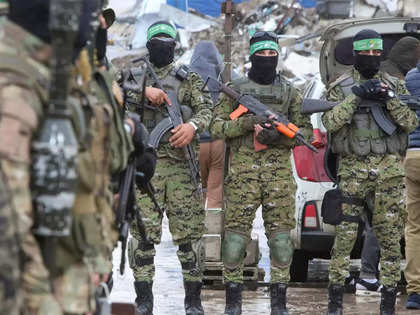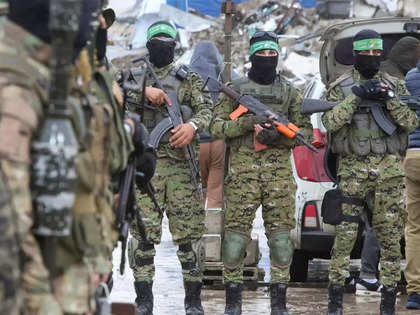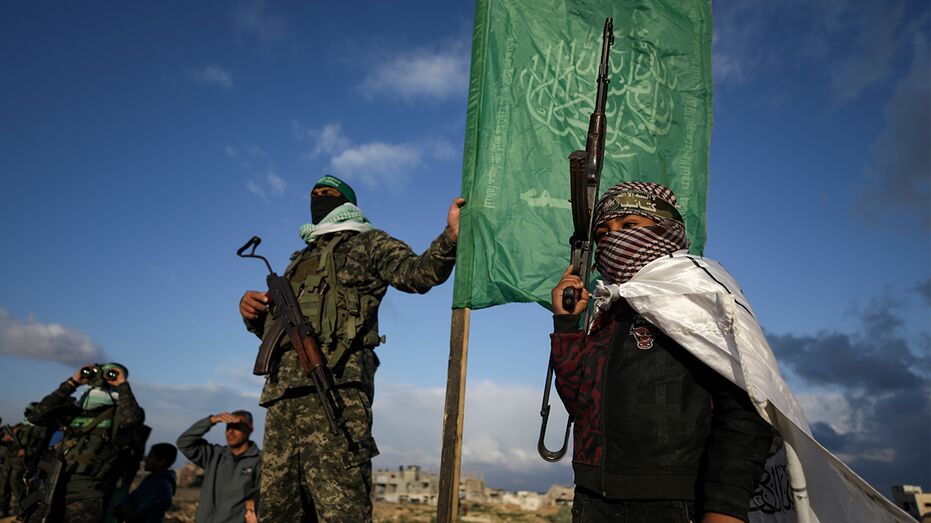
Hamas Releases Two Hostages in Exchange for Over 600 Palestinian Prisoners Amid Fragile Ceasefire
On Saturday, the militant group Hamas took a significant step in the ongoing humanitarian crisis by releasing two Israeli hostages, Tal Shoham, 40, and Avera Mengistu, 39, in exchange for over 600 Palestinian prisoners. This exchange comes on the backdrop of a tenuous ceasefire agreement with Israel, which has been in place for nearly a month.
The Release of Hostages: A Mixed Blessing
The two men, who appeared visibly weakened and fearful in video footage released by Hamas, were escorted onto a stage surrounded by armed, masked militants. Following their release, they were handed over to representatives of the Red Cross, who then transferred them to Israeli Defense Forces (IDF) personnel for further medical evaluation and support.
In addition to Shoham and Mengistu, reports indicated that four more hostages—Omer Wenkert, 23; Omer Shem Tov, 22; Hisham Al-Sayed, 36; and Eliya Cohen, 27—were expected to be released later on Saturday, further complicating the ongoing negotiations and international response.
Context of Hostage Situations
It is essential to note that both Mengistu and Al-Sayed were civilians who voluntarily entered Gaza over a decade ago, well before the escalation of hostilities prompted by Hamas’s October 7 attack on Israel, which marked the beginning of heightened conflict in the region.
Fragile Ceasefire and Rising Tensions
Despite the recent release of hostages, tensions continue to simmer as Israel grapples with complex political and social ramifications. The ceasefire agreement is precarious, and there are concerns regarding the humanitarian conditions in Gaza, particularly regarding civilians caught in the crossfire.
A recent controversy has arisen surrounding the body of hostage Shiri Bibas, a claim made by Hamas to return her remains that has not panned out as expected. The initial promise by Hamas to return her remains led to public outcry, particularly from her family, who have been awaiting closure.
Controversy Over Returned Remains
Israeli Prime Minister Benjamin Netanyahu’s condemnation of Hamas followed allegations that the group provided Israeli officials with the wrong remains—a Palestinian woman instead of Bibas. Shiri Bibas was a mother of two, and her sons, Ariel and Kfir, along with Oded Lifshitz, were returned by Hamas on Thursday amid the hostage exchanges.
In a late Friday statement, Hamas claimed it successfully transferred Shiri Bibas’ body to the Red Cross for remittance to Israeli authorities. By early Saturday, the Bibas family confirmed the identification of the remains as those of Shiri Bibas, thus bringing some measure of resolution to a deeply distressing chapter in the ongoing conflict.
Claims and Counterclaims: The Ongoing Struggle for Truth
Hamas has publicly stated that it has “no interest in withholding any bodies,” attributing the confusion surrounding the returned remains to Israeli airstrikes during November that potentially misidentified hostages among the casualties. This response highlights a broader accountability challenge amid a complex and often chaotic battlefield environment.
The Israeli military, however, has reached conclusions regarding the conditions of the Bibas boys’ deaths, claiming they were brutally killed by Hamas operatives. Rear Admiral Daniel Hagari emphasized that forensic examinations indicated that Ariel and Kfir Bibas were not shot, but rather “killed with their bare hands,” implying a level of brutality that further tarnishes Hamas’s reputation for humane conduct.
Hagari also indicated that Lifshitz met the same fate, raising questions about the treatment of hostages and the moral implications of such actions within the context of international humanitarian law.


















